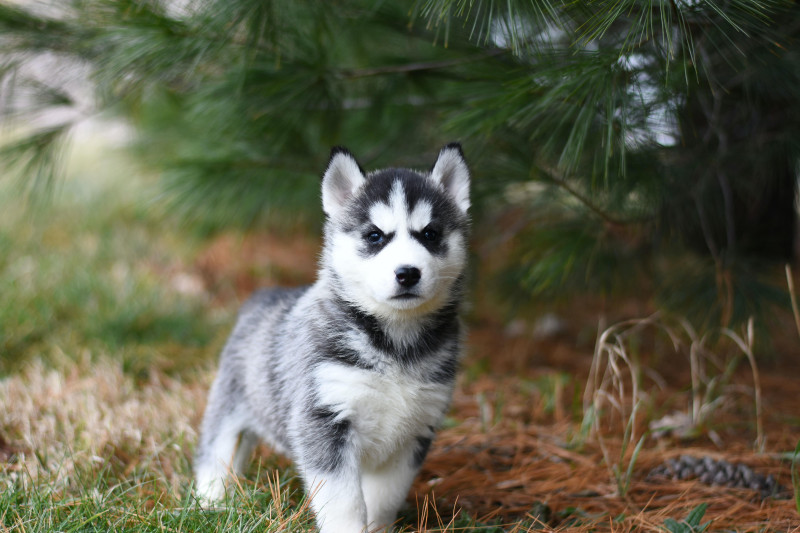Outdoor Safety Tips For Puppies

Puppies love to explore the outdoors. Running, playing, sniffing and hiking provide them with much-needed mental stimulation and physical exercise.
However, you should be cautious of potential dangers outside. Follow our outdoor safety tips to help you to keep your puppy safe in the great outdoors.
Monitor the weather
When taking your puppy outside, it is important to check and prepare for the weather. Avoid taking your puppy outside in extreme weather conditions. Dogs can become overheated and hypothermic more quickly than humans do.
Signs of overheating in dogs include panting, vomiting and diarrhea, disorientation, bright red or blue gums, fast and noisy breathing, collapsing, and convulsing.
Signs of hypothermia in dogs include shivering, difficulty breathing, slow and shallow breathing, a weak heartbeat, weakness, fixed and dilated pupils, a blank stare, muscle stiffness, and low blood pressure.
Check for parasites
Puppies are susceptible to being bitten by parasites whilst outside. Parasites such as fleas, ticks, lice, and mosquitoes can seriously harm your pet. They can contract Lyme disease or develop anemia.
Take preventative measures to try and protect your pet against parasites by ensuring they are up to date on their flea and tick treatments. Always check your pets for parasites and bites after being outdoors.
Signs of anemia in dogs include tiredness, pale gums, exercise intolerance or difficulty exercising, and a decreased appetite.
Signs of Lyme disease in dogs include a fever, loss of appetite, lameness, trouble walking or moving, lethargy or acting tired and swelling in the joints and lymph nodes.
Beware of toxins or poison
Puppies love to sniff and can stick their noses in places they should avoid. This can pose a problem if they come across something that is toxic.
Always be vigilant and avoid common outdoor poison hazards, including stagnant water, chemicals, poisonous creatures, and toxic plants.
There are certain kinds of spiders, frogs, snakes, and toads that can be poisonous to dogs. Some secrete toxins through their skin or inject poison with a bite. Take precautions to avoid areas that they may inhabit.
Many plants are also toxic to dogs. When choosing plants for your garden, be sure to check that they are safe for dogs. Some common plants which are harmful to dogs include azaleas, hydrangea, tulips, daffodils, and lilies. When outdoors, avoid letting your dog eat any plants.
Avoid letting your dog drink from or splash around in stagnant water. Bodies of water such as ponds, lakes, and streams are often home to harmful parasites such as mosquitoes and giardia which are harmful to dogs.
Provide plenty of water
Your puppy must have plenty of fresh water. Ensure they have access to fresh water outside and be sure to take water and a bowl or container with you when going out on a long walk or day out with your puppy. This will help to prevent overheating and dehydration.
Keep away from chemicals
Pesticides and rodenticides can be harmful to your puppy. Try to choose products that are safe whenever possible and always follow the instructions carefully.
Keep containers of chemicals out of your puppy’s reach and ensure they do not ingest anything which has chemicals on or in it, such as swimming pool water or plants.
Ensure your puppy has ID
Ensuring your dog is microchipped and wears a collar and ID tag is not only going to increase your chances of being reunited should they get lost, but it is also the law in the UK.
If you move or get a new phone number, make sure that your details are updated on the microchip and that you get a new ID tag as soon as possible.
Train your puppy
A dog that is well-trained is less likely to get into potential dangers. If they put themselves in harm’s way then you need them to listen to you and follow instructions when you tell them to come or stay or to drop or leave something.
Recall is also important when outdoors with your dog. Even if you only ever walk your dog on a lead or in an enclosed space, your dog could still accidentally get loose, or go up to another dog which could pose a potential risk if they do not come back when called.
Here at WitsEnd, we offer tailored advice, training sessions, and behaviour therapy to help prepare you and your puppy for the great outdoors and to help keep your puppy safe.
Working with people from all over the country, we have had over 2000 success stories! To book an appointment or for more information, please call us on 0116 244 2455.